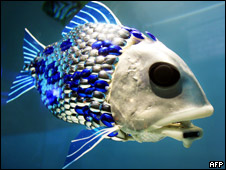The London Aquarium 伦敦水族馆的机器鱼
收听与下载
The script of this programme 本节目台词
John: John and Jean back again and we're On the Town.
Jean: Hi John. 在我们BBC《都市掠影》节目当中,我们会带大家领略伦敦不同的 风景与情趣。
John: Yes, a London landmark. And that landmark today is the London Aquarium.
Jean: 伦敦水族馆。

One of the Aquarium's fish-bots
John: The London Aquarium is the first attraction of its kind in the capital, and is one of Europe's largest exhibitions of global aquatic life, and it's displayed in over two million litres of water.
Jean: Two million litres of water, that sounds impressive! 原来这座水族馆, the Aquarium is the first attraction of its kind. It's an attraction 景点,attraction is just a short way of saying tourist attraction, 吸引游客的景点。
John: The London Aquarium describes itself as being multi-sensory.
Jean: 多感官的。In what way is it multi-sensory John?
John: It combines education, relaxation and entertainment.
Jean: 教育、休闲还有娱乐。But come on John what fish can we see at the Aquarium – that's the most important thing?
John: Well you can come face-to-face with sharks.
Jean: 啊呀!我可不想和鲨鱼作面对面的近距离接触!No sharks, please!
John: You can watch piranhas at feeding time and stroke friendly rays.
Jean: Ah now that's interesting there are piranhas there 比拉鱼,也就是人称的“水虎鱼”或者“食人鱼”。一到了喂食的时间 feeding time, 他们凶猛的本性就暴露的淋漓尽致,全都处于一种疯狂状态,a real frenzy.
John: There's also a very special fish swimming in the waters of the Aquarium at the moment.
Jean: What is it?
John: It's a 'fish-bot'.
Jean: A what?
John: A 'fish bot'. A robot fish. The name is made up of two words, fish and robot, using just the last part of the word robot – bot.
Jean: Fish-bot – 机器鱼! Fish-bot 其实是一个他们创造的新词,是用 fish 鱼和机器人 robot 拼凑出来的。
John: Professor Huosheng Hu of the University of Essex has developed the fish-bot to be able to find leaks in oil pipelines and to detect mines.
Jean: 看来机器鱼可不光是为了好玩的,它可以探测到石油管道的泄漏 leaks in oil pipelines, 还可以探测到海底的矿藏,it can detect mines!
John: But it looks like a fish, and moves gracefully like a fish.
Jean: 我们BBC的记者现场采访了在水族馆参观的一些学生,问他们对水族馆这最新的展品 the fish-bot 到底是个什么感觉! These kids are certainly enthusiastic.
Just beautiful. They're brilliant. They're cool. They're neat. They're wicked. They're massive. They're powerful.
Children at the London Aquarium
John: They are enthusiastic, aren't they?
Jean: 是的,他们特别喜欢这些机器鱼,觉得机器鱼实在是太好看了。
John: Just beautiful.
Jean: 简直太棒了。
John: They're brilliant.
Jean: 实在很酷。
John: They're cool.
Jean: 非常得不错。
John: They're neat.
Jean: 太有意思了。
John: They're wicked.
Jean: 在英式英语里当我们用 wicked 来表达一个正面的意思的时候,这个词就是很棒很精彩的意思。
John: They are also massive and powerful.
Jean: 超级棒又够劲儿。
Just beautiful. They're brilliant. They're cool. They're neat. They're wicked. They're massive. They're powerful.
Children at the London Aquarium
Jean: 看来我们的机器鱼爱好者越来越多了!我们BBC的记者 Matthew Morris 也跑到了伦敦水族馆去看这个机器鱼 the fish-bots. 从他的报导中我们将会听到一些鱼类种类的名称,比如金枪鱼 tuna, 梭鱼 pike, 鳝鱼 eel, 还有一个词就是“海床” sea bed. 让我们来听听看。
The fish aim to swim at the same speed as tuna, have the acceleration of a pike, and the navigation skills of an eel, and it seems, sunglasses for eyes. They've been developed at the University of Essex. The technology could one day be put to use on the sea bed, for example finding leaks in oil pipelines and detecting mines. But for now these little swimmers can be found at the London Aquarium.
Matthew Morris, BBC reporter
Jean: They sound cute! Matthew 把这些机器鱼形容为“小小游泳健将” little swimmers.
John: And I've seen a picture of them Jean.
Jean: Oh great, what are they like?
John: Well, they're white and blue, they shimmer, and they really look like fish!
Jean: They look really quite realistic. 是白色和蓝色相间 white and blue, 它们闪闪发光 they shimmer, 而且它们看上去就像真的鱼一样!
John: And they are really the star of the show at the London Aquarium.
Jean: 希望如果大家有机会也能到伦敦水族馆里来看看这里的神奇机器鱼。
John: See you soon.
Jean: Bye for now.
John: Bye.